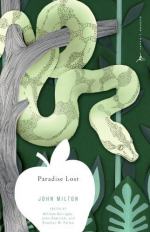|
This section contains 5,949 words (approx. 20 pages at 300 words per page) |

|
SOURCE: “The Epic as Pastoral: Milton, Marvell, and the Plurality of Genre,” in New Literary History, Vol. 30, No. 1, 1999, pp. 143-57.
In the following essay, Weller maintains that Andrew Marvell's poetry rehearses the pastoral motifs that inform John Milton's epic poem Paradise Lost, and he examines how the lyric mode is used in the expansive form of the epic.
When Milton begins Paradise Regained by defining himself as “I who erewhile the happy garden sung,”1 he is echoing the lines—possibly discarded by Virgil, possibly even non-Virgilian—which prefaced Renaissance editions of The Aeneid:
Ille ego, qui quondam gracili modulatus avena carmen, et egressus silvis vicina coegi ut quamvis avido parerent arva colono, gratum opus agricolis; at nunc horrentia Martis
[I am he who once tuned my song on a slender reed, then, leaving the woodland, constrained the neighbouring fields to serve the husbandman, however grasping—a work welcome...
|
This section contains 5,949 words (approx. 20 pages at 300 words per page) |

|


